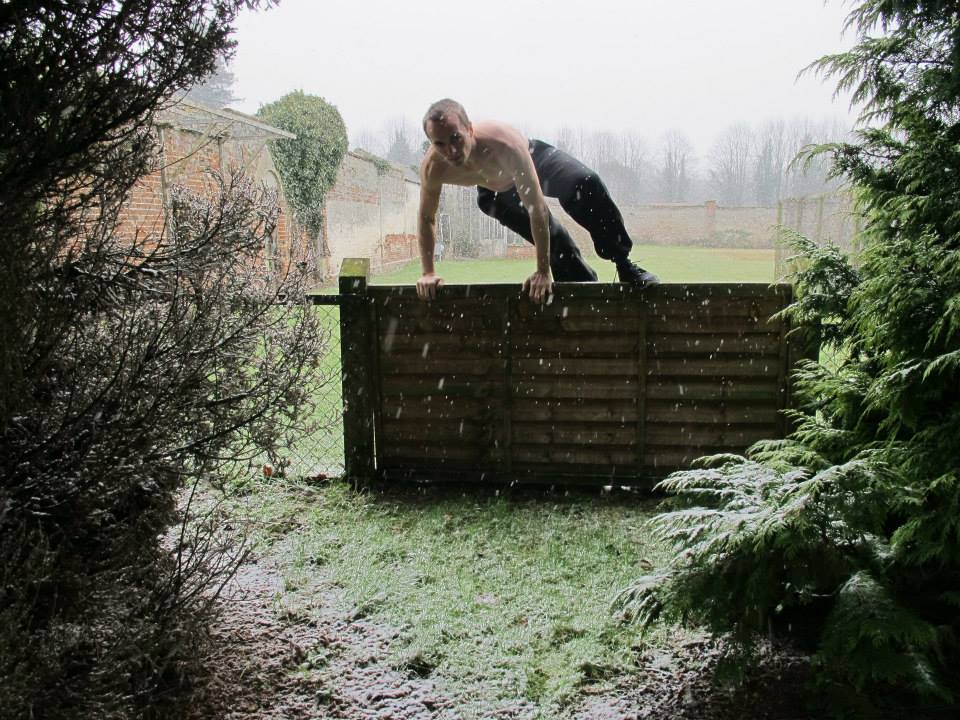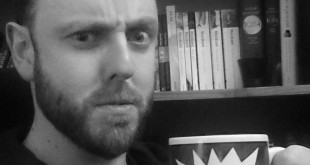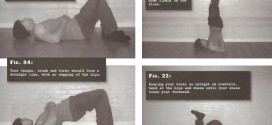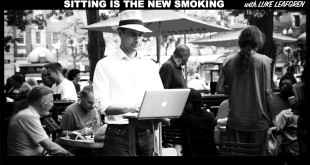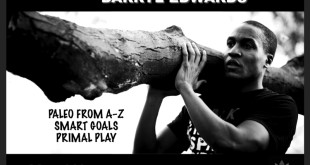Welcome to part two of our interview with Primal Retreat owners, Stuart Daniels and Lorraine Biddle. Read part one now: Primal Retreat Interview, Part One: Safe Starches, Paleo Holidays and Natural Movement.
Stuart is Co-Founder and Fitness Trainer at Primal Retreat. He has been an avid health and fitness enthusiast for over 20 years. He has trained in a wide selection of martial arts for over 10 years including Muay Thai Kick Boxing, Kick Boxing, Tae Kwon Do, Aikido and Krav Maga. Stuart is currently training in Eskrima, which is a form of Filipino stick and knife fighting. Stuart is a MovNat Certified Trainer (MCT) and a Certified Ashtanga Vinyasa yoga teacher (RYA). He also enjoys running and weight lifting. Proudly Paleo since 2007.
Lorraine is Co-Founder and Fitness Trainer at Primal Retreat. She is a MovNat Certified Trainer (MCT) and a Certified Ashtanga Vinyasa yoga teacher (RYA). She has trained in Muay Thai Boxing in Thailand and ran the marathon in Taiwan. Other fitness interests include; kickboxing, boxing, weight lifting, walking, swimming & skiing. Proudly Paleo since 2007.
What do your weekly fitness routines look like?
LB: I work out between 4-5 times a week from 30 minutes to 1 hour. An average week may be, self practice yoga a few times a week, a 20 minute jog and weights once or twice a week, a boxing/kickboxing workout 1-2 times a week and a forest workout with natural movement techniques.
My routine does change from week-to-week. I might spend one whole week focusing more on yoga and the following week more time on weights. It depends on my work schedule and how my body feels. I believe having a few days of rest with minimal or no exercise is beneficial. So, I may take a few days just doing low intensity exercise such as walks.
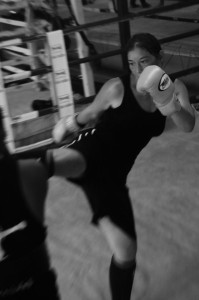 SD: It’s difficult to describe a typical week as my routine changes so much throughout the year depending on the season, what I feel like, what my priorities are. However, a typical week would include a combination of weightlifting, kickboxing, yoga, natural movement workouts, running and walking.
SD: It’s difficult to describe a typical week as my routine changes so much throughout the year depending on the season, what I feel like, what my priorities are. However, a typical week would include a combination of weightlifting, kickboxing, yoga, natural movement workouts, running and walking.
Most sessions will be around 30 minutes, but can be up to 1 hour. Right now I’m also training once a week in Eskrima, a Filipino system of stick and knife fighting. It’s mentally challenging, and an excellent way to switch off.
One of the benefits you boast is ‘better sleep’. What do you think is conducive for a good night’s sleep, how do you incorporate this into a Primal Retreat and what can people do at home to improve their sleep right away?
SD: Sleep is essential and necessary for our physiological operations. Sleep is also key for improving athletic performance, improving memory, boosting mood and energy and increasing stress tolerance.
Reducing exposure to artificial light is really important in getting a good night’s sleep. Artificial light disrupts our circadian rhythm and has an impact on our sleep. Blue light emitted from alarm clocks and other digital devices have been shown to suppress melatonin production. So, covering up or turning off any devices a few hours before bed will help avoid light exposure.
Getting to bed before 11pm makes a big difference. Between 11pm and 3am is where our body regenerates and repairs tissues and engages in other restorative processes. Deep sleep during this time helps to rejuvenate and heal. We find having a sleep routine helps. So, we will often have a bath at night using Epsom salts as we find this really helps with winding down, we might turn down the lights, and read a book before we go to bed. We find this routine helps prepare our body for sleep.
At our Primal Retreats, we encourage our guests to relax and wind down in the evenings. They are free to read our collection of books, listen to music, be social or just spend time on their own. Our retreat is in the countryside with very little street lighting affecting the bedrooms and is extremely quiet. This can really help our guests get a deep and refreshing night’s sleep.
When you’re not busy running Primal Retreat, what do you spend your time doing?
SD: At the moment at Primal Retreat, we run one weekend per month (February–November) and two week-long retreats per year (February and September). We also have clients that like to come on a bespoke retreat where they can choose their own dates and come for as many nights as they wish.
When retreats are not running, we work a few hours a day online doing admin, research and business development. Offline, we read a lot and listen to health and fitness podcasts. We also make time to tend to our vegetable garden which is not only the best for nutrition, but a great way to switch off.
Can you tell us some of the more unusual lifestyle tips you recommend for those looking to improve their overall fitness? Things that initially people may not think would have such a dramatic benefit on their health and wellbeing.
LB: I would recommend spending ten minutes a day focused on movement, mobility and stretching. Simple stretches and movements can have a huge impact on improving fitness in other areas. For example, learning to squat properly can help with lifting weights more efficiently.
SD: For me, meditation is a must, and benefits all areas of life. I see so many people who eat well, and exercise well, but are chronically stressed, and it often leaves them sick. Mediation activates the relaxation response/parasympathetic nervous system, which in turn helps your body burn fat, attain flow states, and perform better.
For many in the UK it’s all about multi-tasking, and doing as many things as possible in a 24-hour period with as little sleep and rest as possible. Rest and sleep are almost dirty words. My tip is to do less, and switch off as much as possible. Turn the mobile off, shut down the laptop, and find things to do that increase inner peace.
Any tips to those who are Paleo and looking to save money due to a tight budget?
LB: I would suggest bulk buying meat/fish when it is reduced and freezing into portions. It is worth comparing prices between supermarkets and local food markets. Sometimes, you can get good value for money at markets but they can also be more expensive.
Planning your meals and bulk cooking can save a lot of money as less food goes to waste as well as saving time. We like to cook a big stew or casserole up and eat that over 2–3 days.
SD: Growing your own food not only saves you money, but it’s bursting with nutrition. You can start off small to make the transition. There are many tasty varieties of lettuce that can be grown all year round. Watercress and chilli plants can also be grown on window sills. Over time you can increase the variety of vegetables and fruits grown and provide a large part of your diet from your back garden.
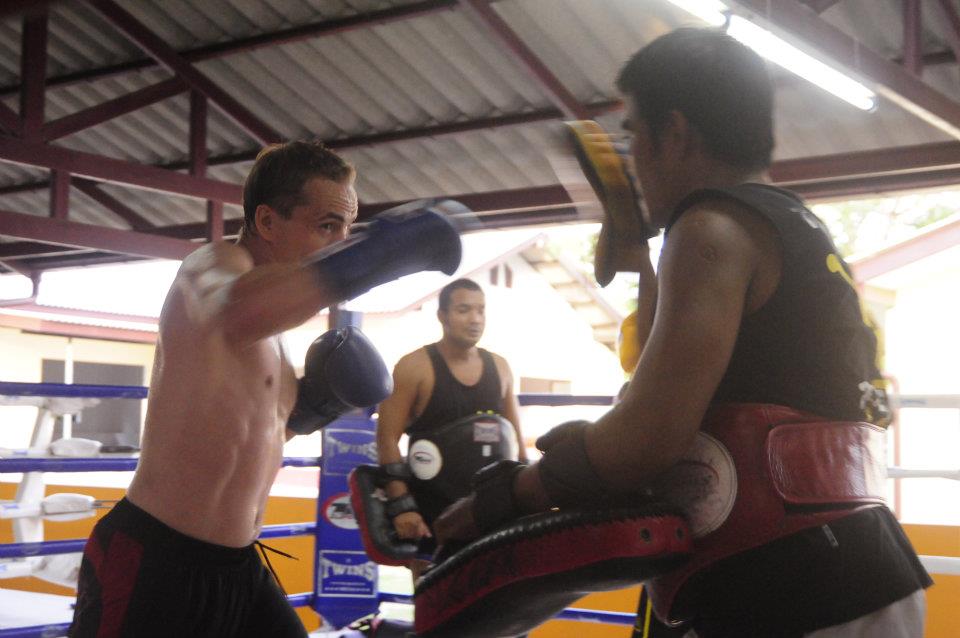 Similarly what tips and advice can you offer when buying food within the UK to ensure quality?
Similarly what tips and advice can you offer when buying food within the UK to ensure quality?
SD: Buy organic, outdoor reared, free range, where possible. You want animals and animal products that are fed as close to a natural diet for their species as possible. Don’t stress too much about it, buy the best you can for your budget, and enjoy it.
Which other Paleo professionals do you recommend our readers seek out?
There are a huge number of Paleo/Ancestral professionals we follow are. Here are some of our favourites.
Mark Sisson
Robb Wolf
Chris Kresser
Dave Asprey (Bulletproof Exec)
Dr Peter Attia
Able James (Fat Burning Man)
The Caveman Doctor
Paul Jaminet (Perfect Health Diet)
J Stanton – gnolls.org
Stephan Guyenet (Whole Health Source)
Western A Price Foundation
Emily Dean – Evolutionary Psychology
Chris Masterjohn
Dr Briffa
Art De Vany
What plans do you have for the future both in terms of Primal Retreat and future projects?
SD: We currently have a few small projects on the go including a UK Paleo cook book.
Where can our readers find out more about Primal Retreat and the work you do.
The best place to find out more about Primal Retreat is our website, which is PrimalRetreat.co.uk, you can follow us on Twitter @PrimalRetreat or on Facebook.
Thank you very much for your time.
 Paleo Minds Paleo diet, fitness and lifestyle.
Paleo Minds Paleo diet, fitness and lifestyle.
